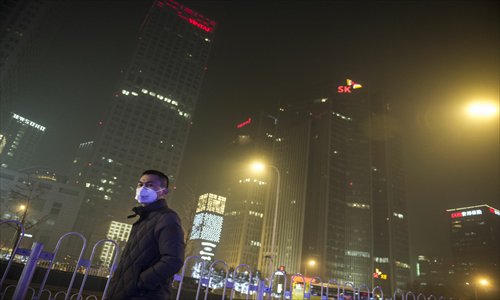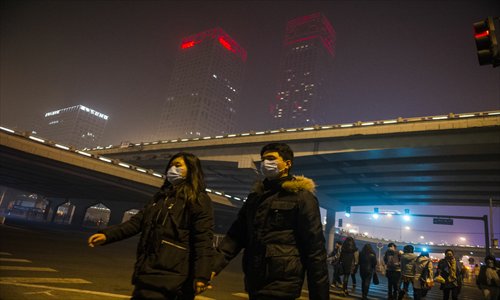

A pedestrian wears a mask as he walks in Beijing's CBD during a heavy bout of smog earlier this month. Photo: Li Hao/GT

Smoking is still the main cause of lung cancer in Beijing, but smog is also a threat. Photo: Li Hao/GT
Bai Yun (pseudonym) was shocked when she was diagnosed with lung cancer in 1999. A non-smoker whose family had no history of lung diseases, her cancer was most likely caused by inhaling secondhand smoke at her office where she worked as a secretary.
"Lung cancer was something new to me at the time. I didn't know what exactly had caused my cancer, and there wasn't much information available on treatment," said Bai.
Over the past decade, cigarette smoke has cleared from offices due to health reforms. But an unavoidable hazard is fueling a spike in the city's lung cancer cases: polluted air.
Lung cancer is the city's biggest killer for men and second biggest for women.
The total number of lung cancer patients in China is expected to reach 1 million by 2025, the highest amount for any country in the world, according to findings released at the China Lung Cancer Summit held in November.
Statistics from the Beijing Municipal Health Bureau show the number of lung cancer patients per 100,000 people was 63.09 in 2011, compared with 39.56 registered in 2002.
Coping with cancer
The first time Bai brought up her cough with her doctor, she was prescribed penicillin to treat what was believed to be a simple case of bronchitis. "The medicine had some effect alleviating my cough, but four months later it returned again. I made another appointment with the doctor, who arranged a CT scan for my lungs. When the results came back, I was told I had lung cancer," Bai said.
Bai had adenocarcinoma, a form of non-small cell lung cancer that is most commonly diagnosed among non-smoking women.
"The tumor was small and had developed very slowly," said Bai. An operation was quickly arranged to remove the tumor, but doctors were still unable to pinpoint the cause of the cancer.
Bai continued taking traditional Chinese medicine for nearly a decade after her operation, despite being cleared of cancer a year after her initial diagnosis.
"My health is much better now, but I still worry on days of severe pollution that could harm my lungs," said Bai.
Links to PM2.5
Wang Fang, a doctor at Wangjing Hospital in Chaoyang district, attributed air pollution as the cause of lung cancer in one of his patients, 49-year-old Qin Ma (pseudonym). Qin, a non-smoker, exercised daily outdoors without wearing a mask before her diagnosis, according to a March report in China Weekly.
"Even the government can't solve the air pollution problem. We're helpless to change the situation. All that I can do is make my mother feel comfortable. If the air is bad, we can only reduce the amount of time we spend outdoors," Qin's daughter told the magazine.
The American Lung Association, an NGO that works to prevent lung disease, said in a statement on October 17 that PM2.5, or particulate matter with a diameter of 2.5 micrometers, was linked to 223,000 lung cancer deaths around the world.
"More than half of the lung cancer deaths attributable to ambient fine particles were projected to have been in China and other East Asian countries," the World Health Organization said in October.
Zhong Nanshan, a renowned respiratory diseases expert famous for spearheading treatment of Beijing SARS patients in 2003, told China Central Television current affairs program News 1+1 that lung cancer cases in Beijing have increased about 60 percent over the past decade.
"Air pollution is more hazardous than SARS. SARS can at least be isolated, but not everyone can avoid being exposed to air pollution," said Zhong.
Zhi Xiuyi, head of the lung cancer treatment center at Xuanwu Hospital in Xicheng district, told Metropolitan that China's lung cancer rates will continue to surge unless immediate action is taken to curb air pollution.
Minimizing risks
Zhi said the main causes of lung cancer in Beijing are inhaling cigarette smoke both firsthand and secondhand, air pollution, gas fumes and chemicals used in the construction and renovation of buildings, such as paints.
"There are two trends linked to lung cancer in China. The first is that the average age of patients is falling. The main age group of lung cancer patients used to be over 50 years old, but now it is over 45. The second is that more women are being diagnosed with lung cancer," Zhi said.
"Research in the US shows that CT scans are the most effective way to detect lung cancer in its early stages. Early diagnosis can reduce the mortality rate among lung cancer patients by 20 percent," said Zhi.
Bu Hanmeng, a doctor who has treated lung cancer patients, said that the most effective detection method is taking orapharyngeal swabs of patients' throats.
"But it isn't easy to encourage the public [to have their throats swabbed]. Furthermore, not all hospitals have suitable equipment or staff trained to carry out this test," said Bu.
Stubbing out the biggest cause
Smoking is still the biggest cause of lung cancer in Beijing, accounting for more than 80 percent of cases. Sun Chao, media officer for the Chinese Association of Tobacco Control (CATC), said that the country's number of smokers has increased since the 1990s to today's 300 million.
"Tobacco consumption has remained high. Every year more than 1 million people die of smoking-related illnesses in China, and more than 100,000 deaths are linked to secondhand smoke," said Sun.
Sun suggested increasing sales taxes on cigarettes and introducing graphic warnings on tobacco products as appropriate measures China should take to curb lung cancer rates.
But the most urgent action needed is enforcing smoking bans in public areas to protect people from secondhand smoke, Sun said.
"We must have a law against smoking in public rather than just a regulation so that a department, such as the police or firefighters, can be tasked with enforcing this law," said Sun, adding that the CATC is also campaigning to ban tobacco advertisements online.
"We're making some progress. Before the cigarette packets only carried health warnings in English, which most Chinese smokers didn't understand. Now, there are warnings in Chinese that make it easier to convey the anti-smoking slogan," Sun noted.
Copyright ©1999-2018
Chinanews.com. All rights reserved.
Reproduction in whole or in part without permission is prohibited.